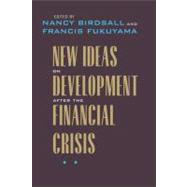
Note: Supplemental materials are not guaranteed with Rental or Used book purchases.
Purchase Benefits
Looking to rent a book? Rent New Ideas on Development After the Financial Crisis [ISBN: 9780801899768] for the semester, quarter, and short term or search our site for other textbooks by Birdsall, Nancy; Fukuyama, Francis. Renting a textbook can save you up to 90% from the cost of buying.
| Preface | p. vii |
| Introduction: The Global Financial Crisis: The Beginning of the End of the ôDevelopmentö Agenda? | p. 1 |
| Implication of the Crisis on Development Thinking | |
| Three Models of Contemporary Capitalism | p. 29 |
| Lessons from the Great Recession | p. 50 |
| The Crisis and the Two Globalization Fetishes | p. 68 |
| Emerging Market Perspectives | |
| China: Getting the Rural Issues Right | p. 85 |
| China's Response to the Global Economic Crisis | p. 111 |
| Latin American Development after the Global Financial Crisis | p. 133 |
| The International Financial Crisis: Eight Lessons for and from Latin America | p. 258 |
| International Institutions | |
| Toward Strengthened Global Economic Governance | p. 191 |
| After the Crisis | |
| The Financial Crisis and Organizational Capability for Policy Implementation | p. 215 |
| The Democratic Recession: Before and After the Financial Crisis | p. 240 |
| The Labor Mobility Agenda for Development | p. 260 |
| Global Economic Crisis and Demographic Change: Implications for Development Policy | p. 288 |
| Conclusion: What Crisis? | p. 311 |
| Contributors | p. 327 |
| Index | p. 331 |
| Table of Contents provided by Ingram. All Rights Reserved. |
The New copy of this book will include any supplemental materials advertised. Please check the title of the book to determine if it should include any access cards, study guides, lab manuals, CDs, etc.
The Used, Rental and eBook copies of this book are not guaranteed to include any supplemental materials. Typically, only the book itself is included. This is true even if the title states it includes any access cards, study guides, lab manuals, CDs, etc.